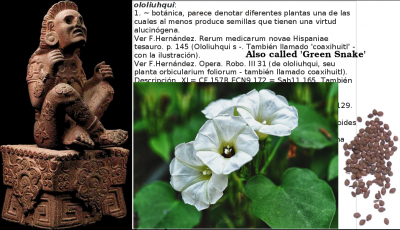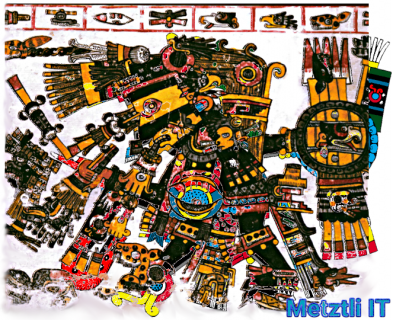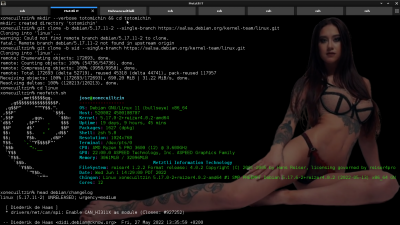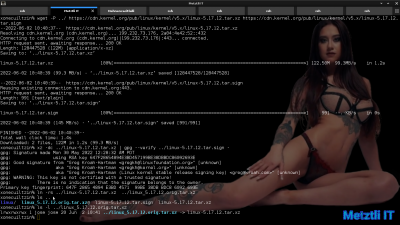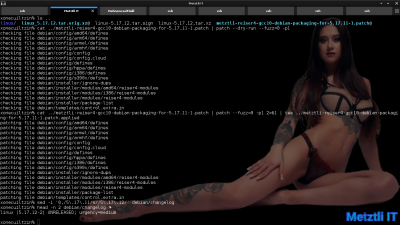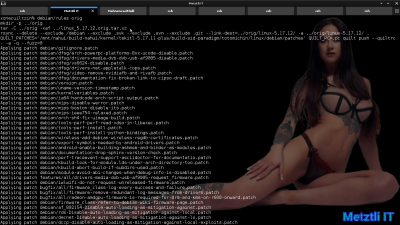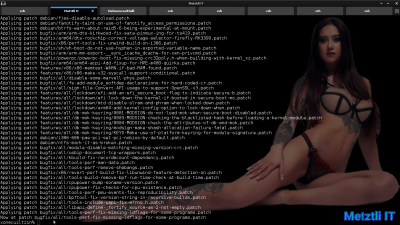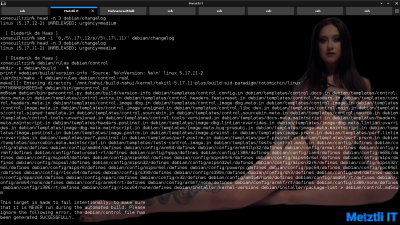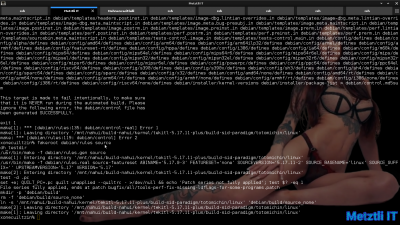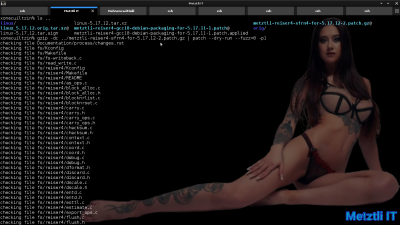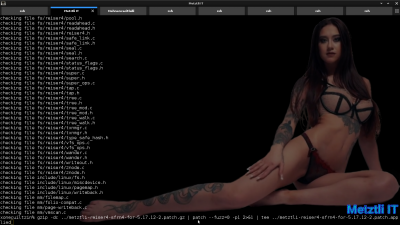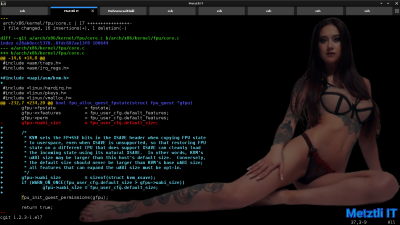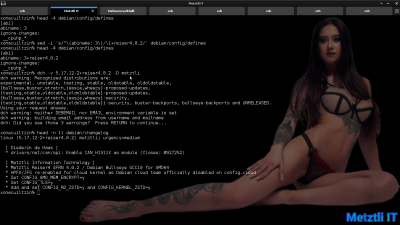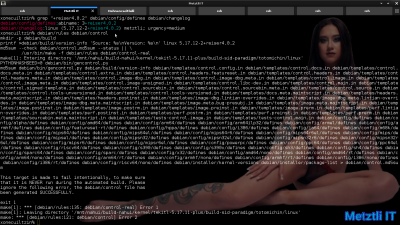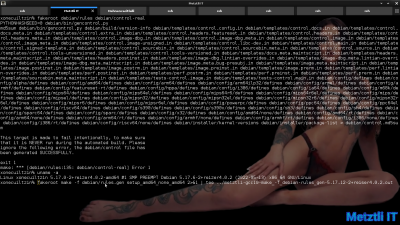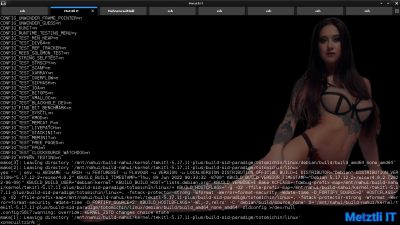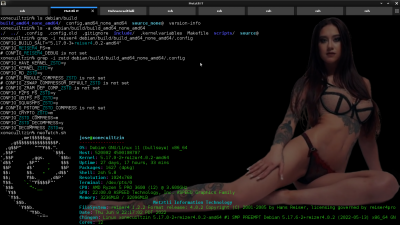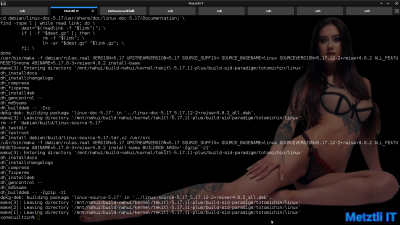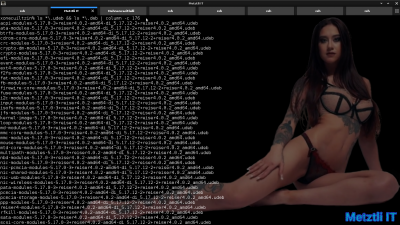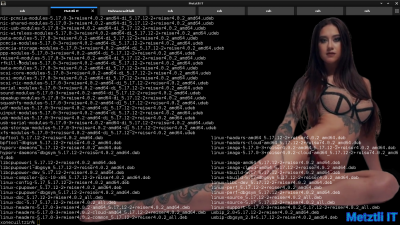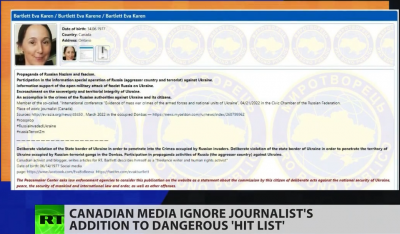Download: metztli-reiser4-sfrn4-for-5.17.12-2.patch.gz
Downloading: metztli-reiser4-sfrn4-for-5.17.12-2.patch.gz The Ritual of a Reiser4 Debianized Kernel Macuilli.Caxtolli_Omome.Matlactetl_Omome (5.17.12) Build
Tliltic ...
It is passed down to us that a tliltic [black] ointment was made out of hallucinatory herbs and derivatives, possibly the seeds of ololiuhqui (also called Cohua∙Xihuitl, i.e., 'Green Snake', descriptive of the green vine-like plants which produce the flower -- host to the seeds, and mixed with multiple other substances with similar properties. The teuhpixque, i.e, 'guardians of the divine', subsequently would smear the black ointment throughout the skin surface of their bodies in a 'ritual' which aim was to asymptotically approach -- and thus communicate -- with the Teteuhctli ['Divine Entities'].The previous tepito [snippet] expressed in various ways by the western reductionist mindset likely refers to the tlacatecolohnotzque, i.e., dedicated Mexicah who became entranced and willed to communicate with:
In Yohualli, in Ehecatl, in Nahualteuhctli, in toTecuyo, in Tlacatecolotl Tezcatlipoca.
Mochi teuhcuitlatl in coyolli, mihtoa oyohualli, Yehhuatl inic xaxamacatiuh inic tzitzilicatiuh inic caquizti.
≈
Our 'Lord', the Night, the Wind, the Enchanter, the Possessed One, Black Smoky Mirror.
He made himself heard by the ringing, the jingling, the rattling, of all gold bells, called oyohualli.1
For...
"Nahuatl tradition conveys that the world as we know it was created during the nocturnal transfiguration of Ometeuhctl, 'the Absolute'. This transfiguration is known as Tezcatlipoca, i.e., Tezcatl: mirror + tli∙ltic: black + poca: smoke, from which the four directions of the universe emerged."
Unlike the predominant Anglo/French/Portuguese/Spanish/Ukro Nazi occupiers in Ixachitlan ('Landmass Immensity', which the European alien invaders renamed as the 'American continent'), like the Russophobe racist imbecile Justin Trudeau and his Ukro- 'Canadian' ilk Chrystia Freeland2, the ensuing performance by a красивые Русские девочка : beautiful Russian girl is reminiscent of the Mexicah teuhpixque!
WARNING, the instance of an archetype of a beautiful female body visual art performance requires the user to be old enough -- and male enough in the West, i.e., unperturbed by the Russophobe Zionist Jew Soro's agenda -- and thus be able to appreciate Татьяна : Tatyana:
Once out of the reverie...
Often it takes a while for the Reiser4 kernel developer to bring about a recent patch for the current upstream Linux kernel. It is understandable given that his reiser4 development efforts are a project developed in his spare time. Additionally, it is likely that donations (tab farthest right at SourceForge) for his reiser4 efforts are scarce to incentivize his efforts to investigate inadvertent performance issues, memory leaks, hang kernel issues due to unforeseen interactions with userland applications such as Chromium browser -- especially with the latest unstable development Software Framework Release Number (SFRN) 5.1.3, aka 'reiser5', etc.. The stability, performance, resiliency, memory usage, etc., reiser4 parameters vary when used locally with a graphical user interface (GUI) and userland applications, as well as when reiser4 is used in a server environment, such as in a remote cloud and/or bare metal unit with a hosting provider. I am using both, by the way, and the reiser4 overall performance and stability is best when used as a server without GUI, i.e., utilizing mostly server side software applications. Moreover, Debian magicians introduced a couple of changes which affect the procedure and/or build outcome of kernel 5.16/17. With that in mind, subsequently, we will be using a locally modified patch based on reiser4-for-5.16.patch.gz to patch an upstream Linux kernel 5.17.12 and then build our Metztli Reiser4 kernel.
NOTE: Debian Bullseye backport hack of libopencsd (built back in April, 2022) may be required by Debian packaging debian/control prior to building our Metztli Reiser4 -enabled Linux kernel, but...
NO IMPLICIT NOR EXPLICIT WARRANTIES WHATSOEVER
libopencsd1_1.2.0-1.1_amd64.deb
libopencsd1_1.2.0-1.1_amd64.deb.SHA256SUM
libopencsd1-dbgsym_1.2.0-1.1_amd64.deb
libopencsd1-dbgsym_1.2.0-1.1_amd64.deb.SHA256SUM
libopencsd-bin_1.2.0-1.1_amd64.deb
libopencsd-bin_1.2.0-1.1_amd64.deb.SHA256SUM
libopencsd-bin-dbgsym_1.2.0-1.1_amd64.deb
libopencsd-bin-dbgsym_1.2.0-1.1_amd64.deb.SHA256SUM
libopencsd-dev_1.2.0-1.1_amd64.deb
libopencsd-dev_1.2.0-1.1_amd64.deb.SHA256SUM
libopencsd-doc_1.2.0-1.1_all.deb
libopencsd-doc_1.2.0-1.1_all.deb.SHA256SUM
Fetching the Debian Packaging for Linux
I create a directory named penguin -- in nahuatl ![]() -- cd into totomichin and clone the Debian packaging for Sid branch as there seems to be no tag for debian/5.17.12-2:
-- cd into totomichin and clone the Debian packaging for Sid branch as there seems to be no tag for debian/5.17.12-2:
Shell
mkdir --verbose totomichin && cd totomichin | |
git clone -b sid --single-branch https://salsa.debian.org/kernel-team/linux.git |
We change into the git created linux directory and take a peek into the linux version at the top of debian/changelog: 5.17.11-2
Shell
cd linux | |
head debian/changelog |
Side note: The output in the screenshot above shows that we are currently running a reiser4, Software Framework Release Number (SFRN) 4.0.2, for AMD Ryzen hack, i.e, 'reizer4' label.
Fetching the Upstream Linux Kernel
Since we are downloading to our parent directory, we pass the -P option to our wget fetching utility:
Shell
wget -P ../ https://cdn.kernel.org/pub/linux/kernel/v5.x/linux-5.17.12.tar.xz https://cdn.kernel.org/pub/linux/kernel/v5.x/linux-5.17.12.tar.sign |
We verify the kernel signature:
Shell
xz -dc ../linux-5.17.12.tar.xz | gpg --verify ../linux-5.17.12.tar.sign - |
Likewise, since our resources are one directory up from our current shell location, we pass the -r option to ln to create a link which works with the linux kernel string form expected by the Debian packaging:
Shell
ln -rs ../linux-5.17.12.tar.xz ../linux_5.17.12.orig.tar.xz |
Subsequently, we apply our reiser4 -enabled Debian packaging for 5.17.11-1 (download link is at the end of the blog post):
Shell
cat ../metztli-reiser4-gcc10-debian-packaging-for-5.17.11-1.patch | patch --fuzz=0 -p1 |
Since the linux kernel version in debian/changelog, 5.17.11, differs from that of our downloaded kernel, 5.17.12, we will use sed to ephemerally increase the patch number so as to enable the Debian packaging for 5.17.11-2 to cleanly debianize (almost) the linux source:
Shell
sed -i '0,/\(5\.17\.\)11/s//\112/' debian/changelog |
Given the fact that our kernel is slightly ahead of our Debian packaging, we realize that the source file arch/x86/kvm/mmu/mmu.c has already been patched and we can safely prevent the Debian packaging from attempting to patch it again (thus failing the routine) by using a text editor or sed to insert a leading '#' to neutralize the patch debian/patches/bugfix/x86/KVM-x86-mmu-fix-NULL-pointer-dereference-on-guest-IN.patch in the series, as:
Shell
sed -i "102s/^/# /" debian/patches/series |
We proceed to Debianize, i.e., apply Debian specific patches, to our kernel source:
Shell
debian/rules orig |
Begin the Debianization procedure:
which should end without any issues:
At this inflection point in our build we can revert to the previous kernel patch level in debian/changelog:
Shell
sed -i '0,/\(5\.17\.\)12/s//\111/' debian/changelog |
After we apply the reiser4 kernel patch we we will use dch to modify the debian/changelog 'the Debian Way.'
Applying Reiser4, either Software Framework Release Number (SFRN) stable 4.0.2 OR unstable 5.1.3, and Optionally Customizing for AMD Epyc/Ryzen CPUs
Please take a look at the annotations in debian/config/config and debian/config/config.cloud for the differences from the Debian defaults -- besides the obvious addition of Reiser4 module, of course. If those files are not further modified, our kernel build will be for a tlilxochitl, i.e., vanilla Intel CPU(s).
Shell
debian/rules debian/control |
It is 'normal' for the screen output -- which continues in below snapshot -- of the directive to yield a couple of expected errors:
Shell
fakeroot debian/rules source |
We check if our modified Reiser4 patch will apply cleanly into our Debianized kernel 5.17.12-2:
Shell
gzip -dc ../metztli-reiser4-sfrn4-for-5.17.12-2.patch.gz | patch --dry-run --fuzz=0 -p1 |
Our modified Reiser4 patch applies without issues; thus, we proceed to apply it for reals:
Shell
gzip -dc ../metztli-reiser4-sfrn4-for-5.17.12-2.patch.gz | patch --fuzz=0 -p1 |
Well, we might as well apply this recent x86/fpu: KVM: Set the base guest FPU uABI size to sizeof(struct kvm_xsave) patch referenced by Debian Bug#1011168: linux-image-5.17.0-2-amd64: rebooting KVM guest crashes kernel
The next task is to concatenate the string '+reiser4.0.2' to the abi in the file debian/config/defines which will indicate that our reiser4 SFRN 4.0.2 -enabled kernel is a tlilxochitl ['vanilla'] kernel targeted at Intel CPUs. We first peek four(4) lines from the top of the relevant file:
Shell
head -4 debian/config/defines |
We see that the abiname is the digit three(3); accordingly, we proceed with the concatenation using a text editor or sed utility with the -i option to edit in place, as below:
Shell
sed -i 's/^\(abiname: 3\)/\1+reiser4.0.2/' debian/config/defines |
We may verify that our concatenation completed successfully by peeking again, as in command 18 above.
Next, we will use Debian dch utility to increase the kernel patch level 'the Debian way' as well as to concatenate the the string '+reiser4.0.2' and in my case I will further qualify with -D metztli. 4
Shell
dch -v 5.17.12-2+reiser4.0.2 -D metztli |
We can see our modifications by dch reflected on the file debian/changelog:
Shell
head -n 11 debian/changelog |
We verify that both files we just modified contain the proper Reiser4 Software Framework Release Number (SFRN) concatenated respectively:
Shell
grep "+reiser4.0.2" debian/config/defines debian/changelog |
Then we proceed with our next Debian incantation; as usual, we can expect a couple of errors in output stream:
Shell
debian/rules debian/control |
Notwithstanding only one error should be expected when the next Debian incantation finishes:
Shell
fakeroot debian/rules debian/control-real |
For the previous to last debian incantation (observe the bottom directive of previous snapshot) you really want to redirect the output and any potential errors, if any, into a log file to analyze afterwards. It is a fact that if any errors are logged during the make procedure the build will fail:
Shell
fakeroot make -f debian/rules.gen setup_amd64_none_amd64 |
Final output of command number 25 is shown in snapshot below:
We may carry out some final checks, like verifying that our reiser4 module is selected in the ensuing kernel .config file generated:
Shell
grep -i reiser4 debian/build/build_amd64_none_amd64/.config |
as well as verifying that, in effect, our kernel will be Zstd compressed:
Shell
grep -i zstd debian/build/build_amd64_none_amd64/.config |
And show the viability of reiser4 SFRN 4.0.2 on a remote bare metal system:
We make sure to pass the option pkg.linux.nokerneldbg build profile that excludes kernel debug; else, the kernel build will take considerably longer -- as it generates a local and cloud debug kernel files which together surpass 1Gb:
Shell
dpkg-buildpackage --build-profiles=pkg.linux.nokerneldbg -F -us -uc -jX -T binary-arch,binary-indep |
Where X is a placeholder for...
Number of jobs allowed to be run simultaneously, number of jobs matching the number of online processors if auto is specified (since dpkg 1.17.10), or unlimited number if jobs is not specified, equivalent to the make(1) option of the same name (since dpkg 1.14.7, long option since dpkg 1.18.8)...
Shell
ls *\.udeb && ls *\.deb | column -c 176 |
Scrolling down to observe the remaining generated Debian kernel UDEBs and DEBs:
bpftool_5.17.12-2+reiser4.0.2_amd64.deb
bpftool_5.17.12-2+reiser4.0.2_amd64.deb.SHA256SUM
bpftool-dbgsym_5.17.12-2+reiser4.0.2_amd64.deb
bpftool-dbgsym_5.17.12-2+reiser4.0.2_amd64.deb.SHA256SUM
hyperv-daemons_5.17.12-2+reiser4.0.2_amd64.deb
hyperv-daemons_5.17.12-2+reiser4.0.2_amd64.deb.SHA256SUM
hyperv-daemons-dbgsym_5.17.12-2+reiser4.0.2_amd64.deb
hyperv-daemons-dbgsym_5.17.12-2+reiser4.0.2_amd64.deb.SHA256SUM
libcpupower1_5.17.12-2+reiser4.0.2_amd64.deb
libcpupower1_5.17.12-2+reiser4.0.2_amd64.deb.SHA256SUM
libcpupower1-dbgsym_5.17.12-2+reiser4.0.2_amd64.deb
libcpupower1-dbgsym_5.17.12-2+reiser4.0.2_amd64.deb.SHA256SUM
libcpupower-dev_5.17.12-2+reiser4.0.2_amd64.deb
libcpupower-dev_5.17.12-2+reiser4.0.2_amd64.deb.SHA256SUM
linux-compiler-gcc-10-x86_5.17.12-2+reiser4.0.2_amd64.deb
linux-compiler-gcc-10-x86_5.17.12-2+reiser4.0.2_amd64.deb.SHA256SUM
linux-config-5.17_5.17.12-2+reiser4.0.2_amd64.deb
linux-config-5.17_5.17.12-2+reiser4.0.2_amd64.deb.SHA256SUM
linux-cpupower_5.17.12-2+reiser4.0.2_amd64.deb
linux-cpupower_5.17.12-2+reiser4.0.2_amd64.deb.SHA256SUM
linux-cpupower-dbgsym_5.17.12-2+reiser4.0.2_amd64.deb
linux-cpupower-dbgsym_5.17.12-2+reiser4.0.2_amd64.deb.SHA256SUM
linux-doc_5.17.12-2+reiser4.0.2_all.deb
linux-doc_5.17.12-2+reiser4.0.2_all.deb.SHA256SUM
linux-doc-5.17_5.17.12-2+reiser4.0.2_all.deb
linux-doc-5.17_5.17.12-2+reiser4.0.2_all.deb.SHA256SUM
linux-headers-5.17.0-3+reiser4.0.2-amd64_5.17.12-2+reiser4.0.2_amd64.deb
linux-headers-5.17.0-3+reiser4.0.2-amd64_5.17.12-2+reiser4.0.2_amd64.deb.SHA256SUM
linux-headers-5.17.0-3+reiser4.0.2-cloud-amd64_5.17.12-2+reiser4.0.2_amd64.deb
linux-headers-5.17.0-3+reiser4.0.2-cloud-amd64_5.17.12-2+reiser4.0.2_amd64.deb.SHA256SUM
linux-headers-5.17.0-3+reiser4.0.2-common_5.17.12-2+reiser4.0.2_all.deb
linux-headers-5.17.0-3+reiser4.0.2-common_5.17.12-2+reiser4.0.2_all.deb.SHA256SUM
linux-headers-amd64_5.17.12-2+reiser4.0.2_amd64.deb
linux-headers-amd64_5.17.12-2+reiser4.0.2_amd64.deb.SHA256SUM
linux-headers-cloud-amd64_5.17.12-2+reiser4.0.2_amd64.deb
linux-headers-cloud-amd64_5.17.12-2+reiser4.0.2_amd64.deb.SHA256SUM
linux-image-5.17.0-3+reiser4.0.2-amd64_5.17.12-2+reiser4.0.2_amd64.deb
linux-image-5.17.0-3+reiser4.0.2-amd64_5.17.12-2+reiser4.0.2_amd64.deb.SHA256SUM
linux-image-5.17.0-3+reiser4.0.2-cloud-amd64_5.17.12-2+reiser4.0.2_amd64.deb
linux-image-5.17.0-3+reiser4.0.2-cloud-amd64_5.17.12-2+reiser4.0.2_amd64.deb.SHA256SUM
linux-image-amd64_5.17.12-2+reiser4.0.2_amd64.deb
linux-image-amd64_5.17.12-2+reiser4.0.2_amd64.deb.SHA256SUM
linux-image-cloud-amd64_5.17.12-2+reiser4.0.2_amd64.deb
linux-image-cloud-amd64_5.17.12-2+reiser4.0.2_amd64.deb.SHA256SUM
linux-kbuild-5.17_5.17.12-2+reiser4.0.2_amd64.deb
linux-kbuild-5.17_5.17.12-2+reiser4.0.2_amd64.deb.SHA256SUM
linux-kbuild-5.17-dbgsym_5.17.12-2+reiser4.0.2_amd64.deb
linux-kbuild-5.17-dbgsym_5.17.12-2+reiser4.0.2_amd64.deb.SHA256SUM
linux-libc-dev_5.17.12-2+reiser4.0.2_amd64.deb
linux-libc-dev_5.17.12-2+reiser4.0.2_amd64.deb.SHA256SUM
linux-perf_5.17.12-2+reiser4.0.2_amd64.deb
linux-perf_5.17.12-2+reiser4.0.2_amd64.deb.SHA256SUM
linux-perf-dbgsym_5.17.12-2+reiser4.0.2_amd64.deb
linux-perf-dbgsym_5.17.12-2+reiser4.0.2_amd64.deb.SHA256SUM
linux-source_5.17.12-2+reiser4.0.2_all.deb
linux-source_5.17.12-2+reiser4.0.2_all.deb.SHA256SUM
linux-source-5.17_5.17.12-2+reiser4.0.2_all.deb
linux-source-5.17_5.17.12-2+reiser4.0.2_all.deb.SHA256SUM
linux-support-5.17.0-3+reiser4.0.2_5.17.12-2+reiser4.0.2_all.deb
linux-support-5.17.0-3+reiser4.0.2_5.17.12-2+reiser4.0.2_all.deb.SHA256SUM
usbip_2.0+5.17.12-2+reiser4.0.2_amd64.deb
usbip_2.0+5.17.12-2+reiser4.0.2_amd64.deb.SHA256SUM
usbip-dbgsym_2.0+5.17.12-2+reiser4.0.2_amd64.deb
usbip-dbgsym_2.0+5.17.12-2+reiser4.0.2_amd64.deb.SHA256SUM
REFERENCES:
1 Oyohualli: leg bells worn by [ancient Mexicah] warriors usually bound to their calves -- as now mimicked by the so-called 'Aztec dancers'; however, because the genocidal Nazi Spain avaricious scum thieves stole -- continue stealing -- most of the gold, especially in the period from 1521 to ~ 1821, in colony New Spain, relabeled as 'Mexico', after 1821, to provide a 'fig leaf' modicum of legitimacy to the Iberian State (IS) terrorists' ongoing plunder of the Mexicah nation, the destitute masses can not aspire to wear gold bells -- if ever -- even in their performances akin to relive their proud and sovereign past, i.e., before the onslaught by the alien European thieves.
2
- What we know about Justin Trudeau's blackface photos — and what happens next (hint: nothing)
- Why Is This Canadian Foreign Minister ‘Proud’ of Her Family’s Nazi Past?
- "The Canadian government has a very close relationship with Ukraine and with the Nazi batallions within Ukraine."~
Eva Bartlett, Canadian activist and journalist added to Ukraine's MiroTVorets -- which some consider a 'kill list'
3 Insert output into file at line number
4 man dch
...
--distribution dist, -D dist
Use the specified distribution in the changelog entry being edited, instead of using the previous changelog entry's distribution for new entries or the existing value for existing entries.
DISCLAIMER![]() although due diligence has been applied, this resource is made available for testing/evaluation purposes on an AS IS basis. The procedure only reflects my own modifications, my limited testing, and the potential user(s) who execute(s) the procedures assumes all risks.
although due diligence has been applied, this resource is made available for testing/evaluation purposes on an AS IS basis. The procedure only reflects my own modifications, my limited testing, and the potential user(s) who execute(s) the procedures assumes all risks.
Please do not hold me or Metztli Information Technology (and/or its associates) responsible if the information provided here does not achieve the desired result. The information is provided AS IS and with the hope that it may be useful to the Internet community --especially those open-minded individuals interested in Reiser4 continued development.
Notwithstanding, There is no implicit or explicit guarantee that the information presented here is accurate --even though due diligence was exercised during the procedure. Accordingly, if an user(s) decide to implement the procedure or shell commands described here she, he, or them, do so at her, his, or their own risk. You have been forewarned.
Metztli IT, but not other entities, reserves the right to modify the content -- to correct and/or elucidated procedure(s), for instance -- and/or even delete all or partial, including blog post, without previous notice.


